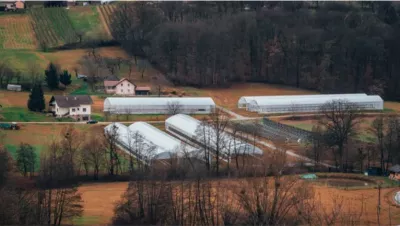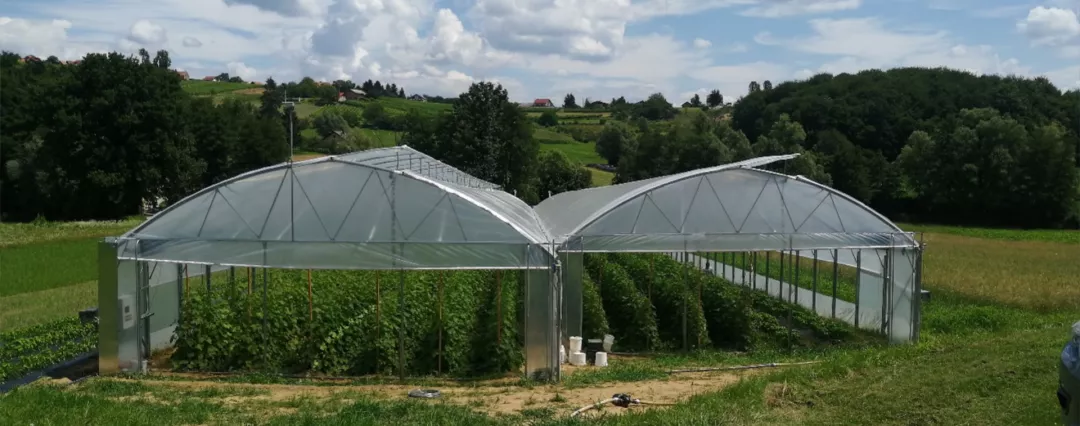General information
RDP Priority
- P2. Competitiveness
RDP Focus Area
- 2A: Farm’s performance, restructuring & modernisation
RDP Measure
- M04: Investments in physical assets
Beneficiary type
- Farmer / land manager
Summary
Due to their lush foliage and shallow root systems, vegetables often need good irrigation to be farmed successfully. Zvonko Pukšič is an organic vegetable farmer in Northeastern Slovenia, who applied for CAP funds to establish an irrigation system. The new system would link an underground well to an intermediate storage tank and the irrigation equipment would then ensure reliable distribution across the farm. Greenhouses were also constructed to extend the production season of organic vegetables.
Results
- The farm has been able to produce new products (including mixed pickled salad and tomato puree) thanks to the larger and more varied crops it can produce throughout the year.
- The farm products are available on the market earlier, which can help guarantee a higher sales price and improved revenues.

Promoter
Zvonko Pukšič
Funding
Total budget: 396 930 (EUR)
EAFRD: 193 281 (EUR)
National/Regional: 61 427 (EUR)
Private/own: 142 222 (EUR)
Ressourcen
Documents
Good Practice Report - My Bioland - Investments in crops and irrigation for the stable production of organic vegetables
(PDF – 1.12 MB)
Links
Context
The Zvonko Pukšič farm is located in northeastern Slovenia. Initially focused on pig farming, the business shifted to the cultivation and processing of organic vegetables and, in 2010, began marketing their own produce and products under the brand name 'Moja Biodežela' (My Bioland).
Vegetables have an abundance of leaf mass and a shallow root system, which means that horticultural production is not possible without irrigation. The Zvonko Pukšič farm, which is dependent on a large vegetable crop for sale and processing, decided to invest in greenhouses and irrigation to secure production across an extended season.
Objectives
The project aimed to improve and increase the organic production of vegetables by investing in a private irrigation system and setting up greenhouses to extend the growing season.
Activities
Project activities included:
- Building an underground well to draw water with a submersible pump. Since the flow from the well was rather modest and would not be sufficient for irrigation, an intermediate reservoir was also built to collect larger amounts of water. The water storage tank has a volume of 240 m3 and was sealed with impermeable foil to prevent water loss. Irrigation water is now transported by means of a pump via a distribution pipeline to hydrants that are placed across the farm. The investment also included appropriate irrigation equipment, which is used to connect to irrigation hydrants.
- Building greenhouses to enable the production of vegetables throughout the year. All greenhouses are covered with double foil and have heating, ventilation and other equipment. Production is automated on the basis of weather parameter measurements and, in this way, the farm is able to regulate irrigation, ventilation, shading and heating in order to create optimal conditions for the growth and development of the plants.
- Installing irrigation systems in the greenhouses with micro-sprinklers, as well as drip irrigation under foil with the possibility of adding nutrients.
- Building an additional water reservoir to collect rainwater from the roofs of the greenhouses for additional irrigation.
Main results
- Outdoor irrigation has significantly improved production as the farm is no longer dependent on rainfall. This allows for more precise planning and implementation of agricultural tasks.
- The farm has been able to produce new products (including mixed pickled salad and tomato puree) thanks to the larger and more varied crops produced throughout the year.
- The farm’s products are now available earlier on the market, guaranteeing a higher sales price and improved revenues.
Key lessons
Foresight planning appreciates that many things can change during implementation.
- Project promoters need to carefully monitor their projects to safeguard intended performance.
- Projects should be able to adapt (within funding conditions) in response to unforeseen events during the implementation.
- The dedication and enthusiasm of the farm owners were key to the successful implementation of the project.
